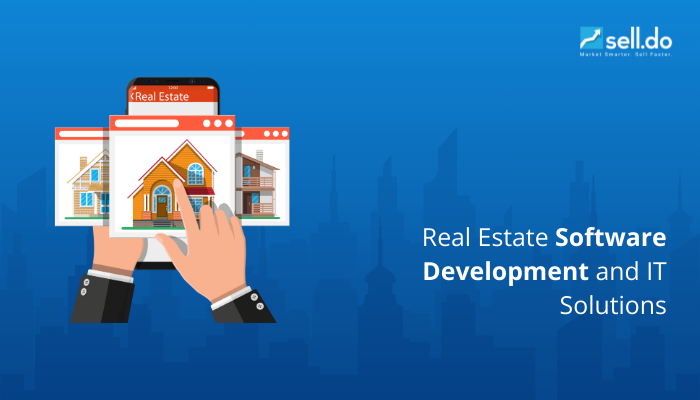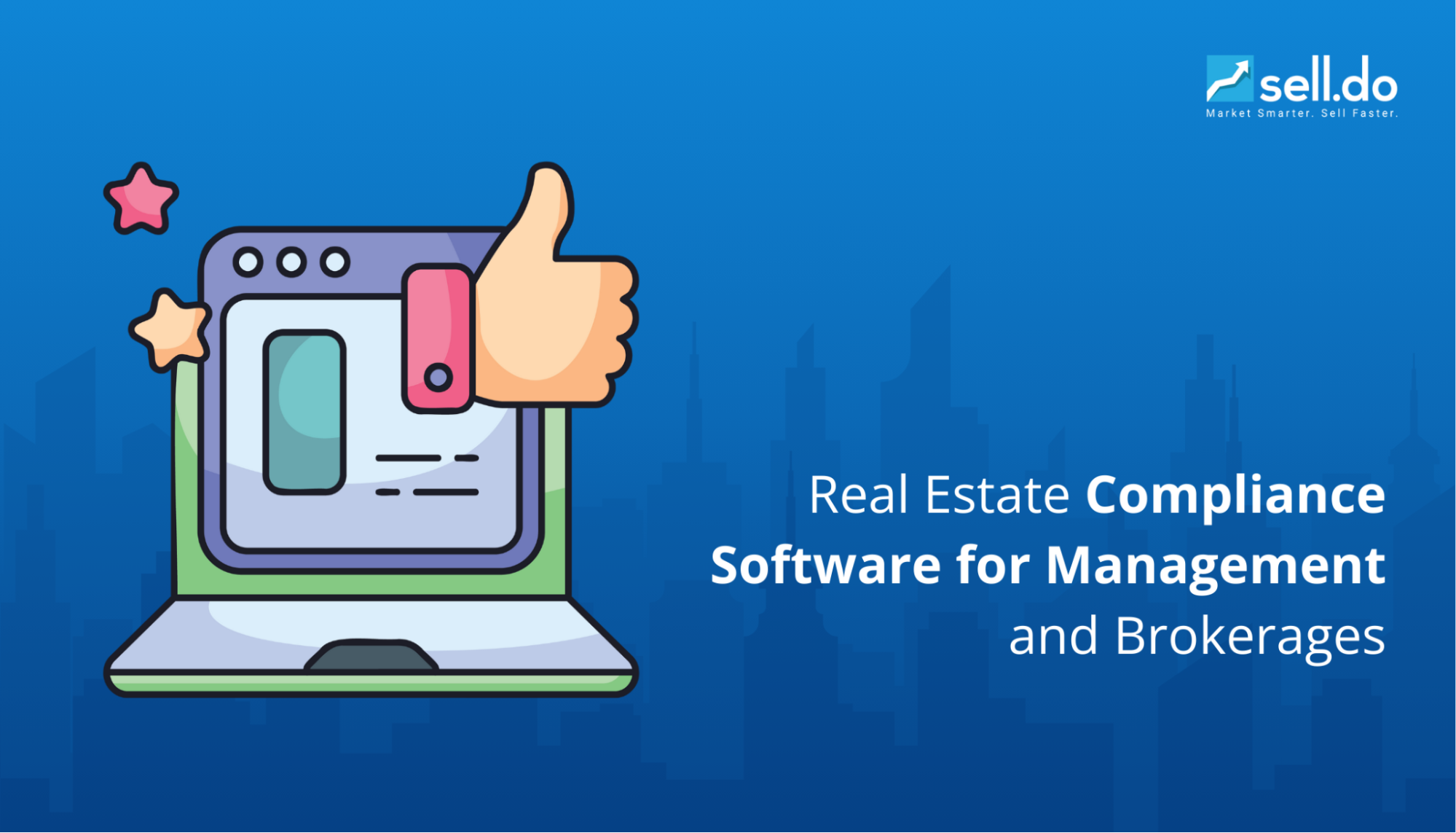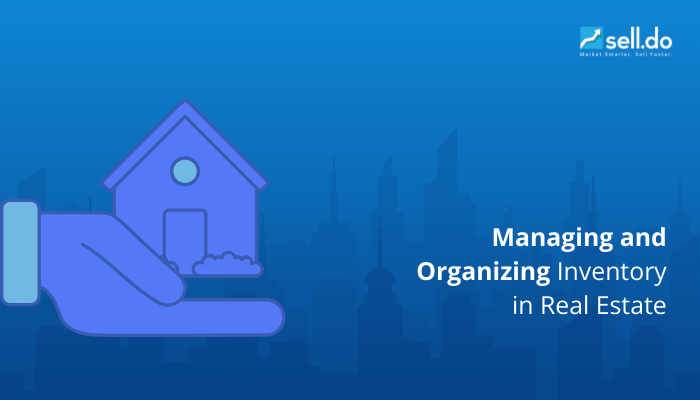If you've been in the real estate business for a while, you've seen the shift. Leads that used to come from hoardings and walk-ins are now coming from online portals, digital campaigns, and social media. Buyers are researching before they call you—and they expect quick responses and solid information right away.
This shift isn’t just about how people buy—it’s a sign of where the entire industry is heading. The demand for housing, commercial spaces, and investment-grade properties is rising fast. And with that, brokerage opportunities are multiplying. According to IMARC Group, India’s real estate market touched $482 billion in 2024 and is expected to hit $1,184 billion by 2033, growing at a CAGR of 10.5%.
That growth means more projects, more clients, and more potential deals—but it also means more brokers entering the game. So, if you’re serious about building a long-term, profitable brokerage business, it’s not just about showing up. It’s about working smarter, using the right tools, and being able to scale without getting buried in day-to-day chaos.
This blog answers how to become a successful real estate broker in today’s market. From refining your daily processes to embracing the right tools and mindset, you’ll walk away with practical strategies to stay ahead, close smarter, and build a business that lasts.
Understanding the Role of a Real Estate Broker
If you’ve been working as a real estate agent for a while, chances are you’ve thought about how to become a successful real estate broker. Becoming a broker isn’t just a title change—it’s a whole new ballgame with more control, responsibility, and earning potential. But before you dive in, it’s important to know what sets a broker apart from an agent—and whether you’re ready to take that step.
Real Estate Agent vs. Broker: What’s the Actual Difference?
In simple terms, an agent works under a broker. Agents are licensed to help clients buy, sell, or rent properties, but they can’t operate independently. Brokers, on the other hand, are licensed to run their own firms, hire agents, and handle more complex transactions.
Think of it like this: if an agent is a skilled driver, the broker is running the entire fleet.
In India, most real estate professionals begin as agents working for a brokerage or as part of a developer’s in-house sales team. But once you gain experience and understand how deals flow, client needs evolve, and markets shift, it makes sense to explore brokerage as your next move.
Key Responsibilities and Expectations of a Broker

Learning how to become a successful real estate broker means shifting from being a top-performing agent to stepping into the mindset of a business owner. That shift brings new priorities:
- Team Leadership: Whether you’re building a brokerage from scratch or scaling an existing one, your ability to recruit, mentor, and retain agents directly impacts growth.
- Operational Oversight: From budgeting and reporting to managing tech platforms like CRMs and listing portals, brokers must keep every moving part of the business aligned.
- Client Strategy: Brokers aren’t just closing deals—they’re shaping the long-term client strategy, ensuring repeat business and referrals through trust and service quality.
- Compliance Management: With real estate laws evolving across Indian states, especially under RERA, staying compliant isn’t optional. Brokers must ensure that all deals, documents, and disclosures meet legal requirements.
- Brand Building: You’re not just selling properties—you’re selling a name, a reputation, a business identity. Brokers are expected to create a brand that’s credible, visible, and consistent across every touchpoint.
Now that you have a clear picture of what a broker actually does, the next step is understanding how to become a successful real estate broker, starting with the educational and licensing requirements that form the backbone of your career.
Manage your real estate operations more efficiently with Sell.Do’s real estate CRM. From automating routine tasks to offering real-time insights, it brings everything you need into one platform—so you can focus less on day-to-day administration and more on growing your business.
Educational and Licensing Requirements
Understanding how to become a successful real estate broker starts with more than just ambition—it begins by meeting the right qualifications. While the Indian market is still evolving, education and legal licensing are becoming must-haves for anyone aiming to build long-term credibility in the industry.
Necessary Educational Background and Courses
Unlike some industries where formal education isn’t strictly necessary, real estate in India is shifting toward a more regulated and credibility-driven model. While there’s no fixed degree required to become a broker, having a background in fields like business, marketing, law, or finance gives you a solid foundation—especially if you plan to manage operations or lead a team.
What’s becoming increasingly important is industry-specific knowledge. That’s where short-term courses and certifications come in. Institutions such as the RICS School of Built Environment, the National Institute of Real Estate Management (NIREM), and the Institute of Real Estate and Finance (IREF) offer programs that cover real estate laws, valuation, project management, and property marketing.
Taking these courses won’t just give you credibility—it will help you speak the language of buyers, investors, and regulatory bodies with confidence. And in today’s market, being informed is what separates a serious professional from someone who’s just winging it.
Steps to Obtain a Real Estate License

With RERA (Real Estate Regulatory Authority) now in place, registering as a real estate broker is no longer optional—it’s legally required in most Indian states.
Here’s how the process typically works:
- Apply for RERA Registration: Visit the official RERA portal of your state and fill out the broker registration form. Each state has its own portal, so make sure you're applying in the correct jurisdiction where you’ll be operating.
- Documentation: You’ll need to submit essential documents like:
- PAN card and Aadhaar
- Proof of business address
- Passport-sized photographs
- Details of past experience (if any)
- Partnership deed or incorporation certificate if you're registering as a firm
- Payment of Fees: The registration fee varies from state to state. For instance, in Maharashtra, the RERA registration fee for individual brokers is ₹10,000, and for firms, it’s ₹1,00,000.
- License Validity: Once approved, the license is valid for 5 years, after which you need to renew it. During this period, you are expected to comply with RERA regulations, including ethical conduct and record maintenance.
- State Variations: Some states may require additional steps, like background checks, training hours, or state-level examinations. So always check the specific RERA rules applicable to your region.
The license proves you’re qualified. Gaining field experience proves you’re ready. Let’s look at how to build that experience strategically.
Don’t miss our blog: Understanding the Real Estate Lead Management Process for practical strategies to boost your conversion rate.
Gaining Experience in the Field
Before you step into the broker’s shoes, you need hands-on exposure to what the job actually entails. Starting your journey as a real estate agent is a strategic move—it lays the foundation for how to become a successful real estate broker by grounding you in the realities of the business and building your credibility.
Starting as a Real Estate Agent to Build Foundational Knowledge
Getting your start as a real estate agent gives you a practical understanding of the industry. It’s where you learn to read between the lines of deals, manage client expectations, and work through the unpredictable nature of the property market. Here’s how early field experience helps shape your foundation as a future broker:
- Client communication becomes second nature: You learn how to guide buyers and sellers through big decisions, handle objections, and adapt to different personalities.
- You become market-aware, not just market-informed: Instead of just reading about price trends or inventory levels, you experience them firsthand—on calls, during visits, and at the negotiation table.
- You learn the end-to-end deal process: From listings and showings to paperwork and closing formalities, you understand every moving part of a transaction.
- You sharpen your problem-solving skills: Whether it’s a last-minute deal breaker or a hesitant buyer, field experience teaches you how to think on your feet.
Importance of Mentorship and Learning from Experienced Professionals
No course can replace the impact of real-world guidance when you're figuring out how to become a successful real estate broker. A good mentor doesn’t just teach—they coach, challenge, and support. They help you avoid common pitfalls and push you toward smart decisions. Here’s why learning from experienced professionals makes a big difference early in your career:
- You gain access to real-time strategy: Observing how experienced brokers handle negotiations, manage clients, and troubleshoot issues is far more valuable than theory.
- You get honest feedback: A mentor will call out the things you miss, suggest better approaches, and help you build better habits from day one.
- You build long-term confidence: With someone backing you, you’re more likely to take initiative, handle pressure, and learn from mistakes.
- You expand your network early: Many mentors introduce you to their ecosystem, giving you access to partners, clients, and local stakeholders that would otherwise take years to reach.
Learning on the job is important, but knowing what skills to focus on makes a big difference. You’ll find that in the next section.
How to Develop Essential Skills?
Skills are the real currency in real estate. From how you speak to what you know, every interaction you have shaped your reputation. This section breaks down the three non-negotiable skill sets every aspiring broker must work on.
Communication Skills
Solid communication isn’t just about talking—it’s about listening, negotiating, and delivering clarity when emotions and stakes are high. In real estate, deals are built (or broken) on the strength of your communication. Here’s how you can improve how you connect with your clients and close with confidence:
- Practice active listening: Clients often don’t say exactly what they mean. Listen beyond words to understand their concerns, motivations, and expectations.
- Learn to simplify complex details: Whether it’s paperwork or legal terms, your ability to break things down builds client trust.
- Stay calm under pressure: Difficult conversations are part of the job. Managing your tone and being solution-focused helps keep deals alive.
- Negotiate with empathy, not ego: Understand both sides of the deal and focus on value, not just price. A win-win outcome builds long-term relationships.
Market Knowledge
Your credibility depends on how well you understand the market you operate in. Clients rely on you to guide them through one of the biggest investments of their lives—and that requires real-time, actionable insight. Build and sharpen your market understanding with these steps:
- Stay plugged into trends and inventory data: Track local property cycles, price shifts, and buyer demand regularly—not just during listing periods.
- Study local regulations and zoning updates: What’s happening in your region affects property values, future developments, and buyer sentiment.
- Compare properties critically: Go beyond the surface to understand why one property sells faster than another—layout, location, builder reputation, and timing all matter.
- Use data to guide clients: Back your advice with facts, not gut feelings. Whether it's a pricing strategy or investment outlook, clients appreciate evidence-based guidance.
Networking Abilities
Real estate thrives on relationships. Whether it’s getting a lead from a fellow agent, partnering with legal and financial experts, or getting referrals from past clients, your network is your growth engine. Here’s how to grow and nurture a strong professional network:
- Attend local real estate events and forums: In-person connections still matter. Meet builders, developers, and fellow agents regularly.
- Collaborate with adjacent professionals: Lawyers, bankers, interior designers, and home inspectors can all become valuable partners.
- Stay in touch beyond deals: Send updates, check in on anniversaries, and show that you value the relationship, not just the commission.
- Ask for referrals, but earn them first: Deliver a good experience, and don’t be shy to ask happy clients for introductions to others in their circle.
Even with the right skills, running a successful real estate business takes more than just hustle. You need a plan, and this next part shows you how to build one that works.
Looking to generate more leads? Explore our blog: Top Real Estate Social Network Platforms and their Strategies for Actionable Tips
How to Create a Practical Business Plan?
Before you step out to find clients or close deals, you need clarity on your goals, your strategy, and your money. This section covers how to build a plan that helps you move with direction, not just effort.
Setting clear, achievable goals and objectives
You can’t grow a business if you’re unclear about what you want to achieve. That’s why your business plan should start with goals that are specific, realistic, and measurable.
- Define what success looks like for you—Is it a number of deals per year? A revenue target?
- Break larger goals into monthly or quarterly milestones so you can track progress.
- Keep them flexible but focused. Markets shift, and your goals should adapt—but they shouldn’t disappear.
A good goal isn’t just inspiring—it helps you stay grounded in reality while still pushing forward.
Developing marketing strategies to attract clients
No matter how skilled you are, if people don’t know you exist, they can’t hire you. Your marketing strategy should be a core part of your business plan.
- Start with the basics: a professional website, Google Business listing, and a presence on platforms like Instagram, Facebook, or LinkedIn.
- Identify your target audience—residential buyers? Commercial clients? Investors?—and craft messaging that speaks to them directly.
- Plan for both online and offline marketing: local events, signage, referrals, content, and ads.
Your goal here isn’t just to show up—it’s to show up where your potential clients are already looking.
Financial planning and budgeting for business operations
Real estate is commission-driven, and income can fluctuate. That’s why planning your finances from the start is key.
- Outline your monthly and yearly expenses—office rent, transportation, marketing, software, etc.
- Estimate your expected income based on realistic projections, not best-case scenarios.
- Create an emergency fund for slow months and plan your investments wisely—especially in tools or platforms that help you stay organized and productive.
When you treat your brokerage like a business from day one, you're more likely to build something that lasts.
Once you have your business plan in place, the next step is execution—and in today’s market, that means knowing how to use the right tools to your advantage. This next section walks you through how technology and marketing can power your growth.
Also Read: How to Power-up Your Real Estate CRM and Social Media Integration?
How Can Technology and Marketing Tools Boost Your Real Estate Game?
Smart tools can save time, expand your reach, and help you build stronger relationships with clients. If you're serious about how to become a successful real estate broker, this is where you should focus next.
Whether you're handling five clients or fifty, keeping everything organized and efficient is non-negotiable. Today’s real estate brokers aren’t just sales experts—they’re also expected to be tech-savvy marketers who know how to stay visible and valuable in a crowded space. Here’s how you can put the right tools to work:
Utilize Digital Platforms for Listings and Virtual Tours
- Use high-traffic property portals like 99acres, MagicBricks, and Housing.com to post your listings.
- Add virtual tours, video walkthroughs, and drone shots to help prospects experience properties remotely.
- Track listing engagement and performance to tweak descriptions, pricing, or media when needed.
This approach helps you show up where your buyers already are—online.
Implement a CRM to Manage Client Interactions
- A CRM like Sell.Do help you keep track of all client interactions, property interests, and deal progress in one place.
- Automate follow-ups, reminders, and alerts so no lead goes cold.
- Segment your leads based on preferences or location to send more relevant messages.
Engage in Social Media and Online Advertising
- Share your listings, open house updates, and client reviews on Instagram, Facebook, and YouTube.
- Run targeted ads to attract local buyers and renters, especially in high-demand zones.
- Create helpful content like market insights, buying checklists, or financing tips to stay on your audience’s radar.
Before you know it, tools and tactics will evolve. What worked yesterday might feel outdated tomorrow. That’s why staying sharp and current isn't optional. It’s essential. The next step is about staying committed to growth.
Also Read: Tech Adoption For Efficiency In Real Estate Business
What Role Does Continuing Education Play in Your Growth as a Broker?
Establishing credibility and staying relevant means always learning and always adapting.
Success in real estate isn’t just built on closing deals. It’s built on knowledge, credibility, and the ability to anticipate change. If you're wondering how to become a successful real estate broker, it starts with consistently investing in learning—so you’re ready to meet client expectations, adapt to market shifts, and stay compliant with industry updates.
Pursuing advanced certifications and specializations
Certifications show that you're serious about your work. In India, RERA certification is non-negotiable if you want to be seen as legitimate. But beyond that, advanced designations like the Certified Residential Specialist (CRS), Accredited Buyer’s Representative (ABR), or green building certifications help you deepen your expertise.
Attending workshops, seminars, and industry conferences
Being in spaces where ideas are exchanged keeps you fresh. Whether it’s a local seminar or a national expo, these events connect you with peers, developers, and thought leaders. You gain insights into trends, strategies, and tools that others are using. Sometimes, it’s a single conversation that sparks a new way of thinking or working.
Staying updated with real estate laws and regulations
Regulations are constantly evolving. From changes in stamp duty and GST to local development rules, you need to stay on top of it all. Keeping an eye on RERA updates, attending legal briefings, or following reliable industry newsletters can save you from compliance issues. Clients value brokers who are not just persuasive but also informed and responsible.
Once you’re investing in your own growth, the next step is making sure others can see that value too. And that’s where your personal brand starts to matter.
Also Read: The Ultimate Guide to Real Estate CRM Lead Management
Building a Personal Brand That Sets You Apart
Your brand is more than a logo or a business card—it's the perception people have when they think of you. In real estate, where trust and visibility go hand in hand, building a strong personal brand is a key part of how to become a successful real estate broker. Here’s how to build one that sets you apart:
Establish a unique value proposition and professional image
What makes you different from other brokers in your area? Maybe it’s your deep knowledge of a particular neighborhood, your data-backed approach to property pricing, or your ability to close complex deals. Whatever it is, make sure it’s clear and consistent in every conversation, pitch, or post.
Maintain consistent branding across marketing materials and platforms
Whether it’s your social media profile, website, WhatsApp message, or listing presentation, consistency builds familiarity. Use the same tone, color scheme, photo style, and messaging to reinforce your image across all touchpoints.
Gather and showcase client testimonials and success stories
Real stories from real clients are powerful trust-builders. Video testimonials, Google reviews, or short case studies on your website can do more to build credibility than any sales pitch. Just make sure they highlight the outcome, not just the experience.
Of course, even the best personal brand means little if the client experience doesn’t hold up. That’s why the next section dives into the heart of real estate success: consistently delivering excellent service.
Also Read: CRM Software System for Real Estate Brokers
Providing Exceptional Client Service That Builds Loyalty
Client service isn’t a checkbox—it’s the core of your reputation and the driver behind repeat business and referrals. When done right, it’s what keeps your phone ringing long after a deal closes.
- Prioritize client needs and maintain open communication.
Whether your client is a first-time homebuyer or an experienced investor, the basics remain the same—listen more than you speak, respond promptly, and make them feel supported throughout the process. - Ensure transparency and honesty in all transactions.
Be upfront about costs, timelines, risks, and any market uncertainties. Clients appreciate clarity, even when it’s uncomfortable. It’s better to be honest and lose a deal than overpromise and damage trust. - Go above and beyond to exceed client expectations.
This could mean sending property reports they didn’t ask for, helping them connect with a reliable contractor, or simply checking in after closing. Small gestures often leave the biggest impact.
In a competitive market, good service isn’t optional—it’s your most reliable growth strategy. The better you serve, the louder your referrals speak.
Also Read: CRM Best Practices for Real Estate Developers
How Real Estate Agents Can Rely on Sell.Do?

Managing leads, campaigns, site visits, and follow-ups manually can leave room for error—and eat into your time. Sell.Do is built for real estate professionals like you who need a smarter, faster, and more connected way to handle operations and sales. Here’s how Sell.Do supports brokers at every stage of their journey:
- A CRM Built Specifically for Real Estate
Unlike generic CRMs, Sell.Do understand the real estate sales cycle—right from the first inquiry to final booking. It helps you track, manage, and follow up with the leads across channels, keeping you organized and responsive. - Marketing Automation That Works Round the Clock
Whether it's drip campaigns, SMS follow-ups, or email sequences, Sell.Do’s automation engine ensures no lead slips through the cracks without you having to chase them manually. - End-to-end sales tracking and reporting
Get a clear picture of how your properties and agents are performing. The detailed dashboards help you make decisions based on data, not guesswork. - Built-in tools for site visit management and broker collaboration
Schedule, track, and manage site visits with ease, and collaborate seamlessly with your internal teams or external brokers—all from one platform. - Support for developers, channel partners, and brokerages
Whether you're a solo broker or part of a larger network, Sell.Do adapt to your scale and team structure. You can even manage multiple projects and inventories centrally.
In short, Sell.Do is more than a CRM—it’s your digital assistant that helps you spend less time on backend work and more time closing deals and building your business.
Also Read: CRM Features That Real Estate Developers Need To Consider
Conclusion
Success in real estate brokerage doesn’t happen overnight. It takes a mix of experience, strong business acumen, consistent client service, and a willingness to keep learning. Whether you're just starting out or ready to take your brokerage career to the next level, every step—no matter how small—adds up.
From understanding the licensing process to mastering client relationships and building a standout personal brand, this guide has walked you through the essentials. The real game-changer, however, is how you manage your day-to-day operations—and that’s where the right tools can make all the difference.
Sell.Do is built specifically for real estate professionals who want to work smarter. Its features—from lead management and omnichannel communication to performance tracking—help you stay organized, close more deals, and grow your business efficiently.
Ready to simplify your operations and scale your brokerage? Book a free demo with Sell.Do today and explore how it can support your growth in a fast-paced real estate market.






Leave a comment
Comments (0)
Be the first one to comment.